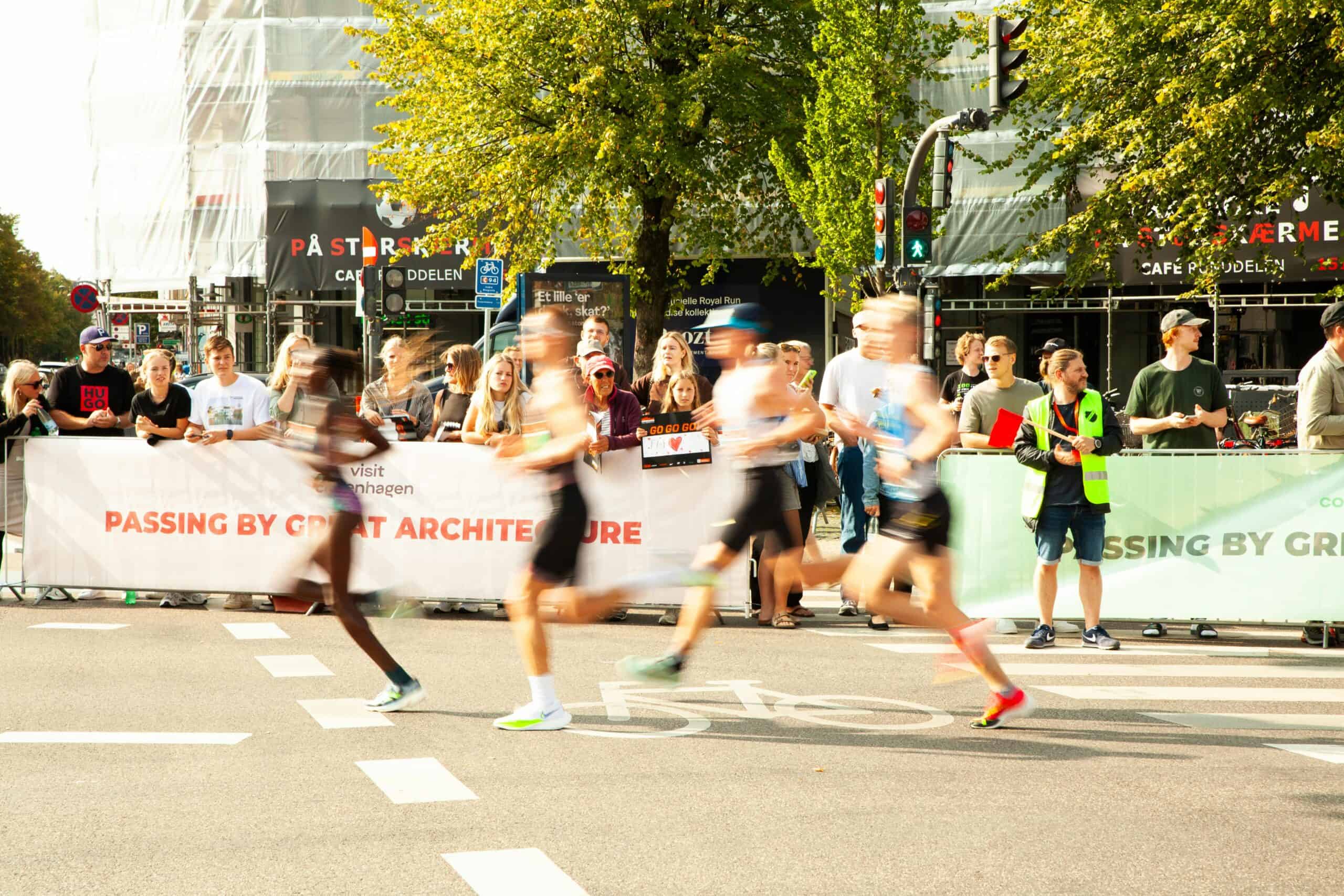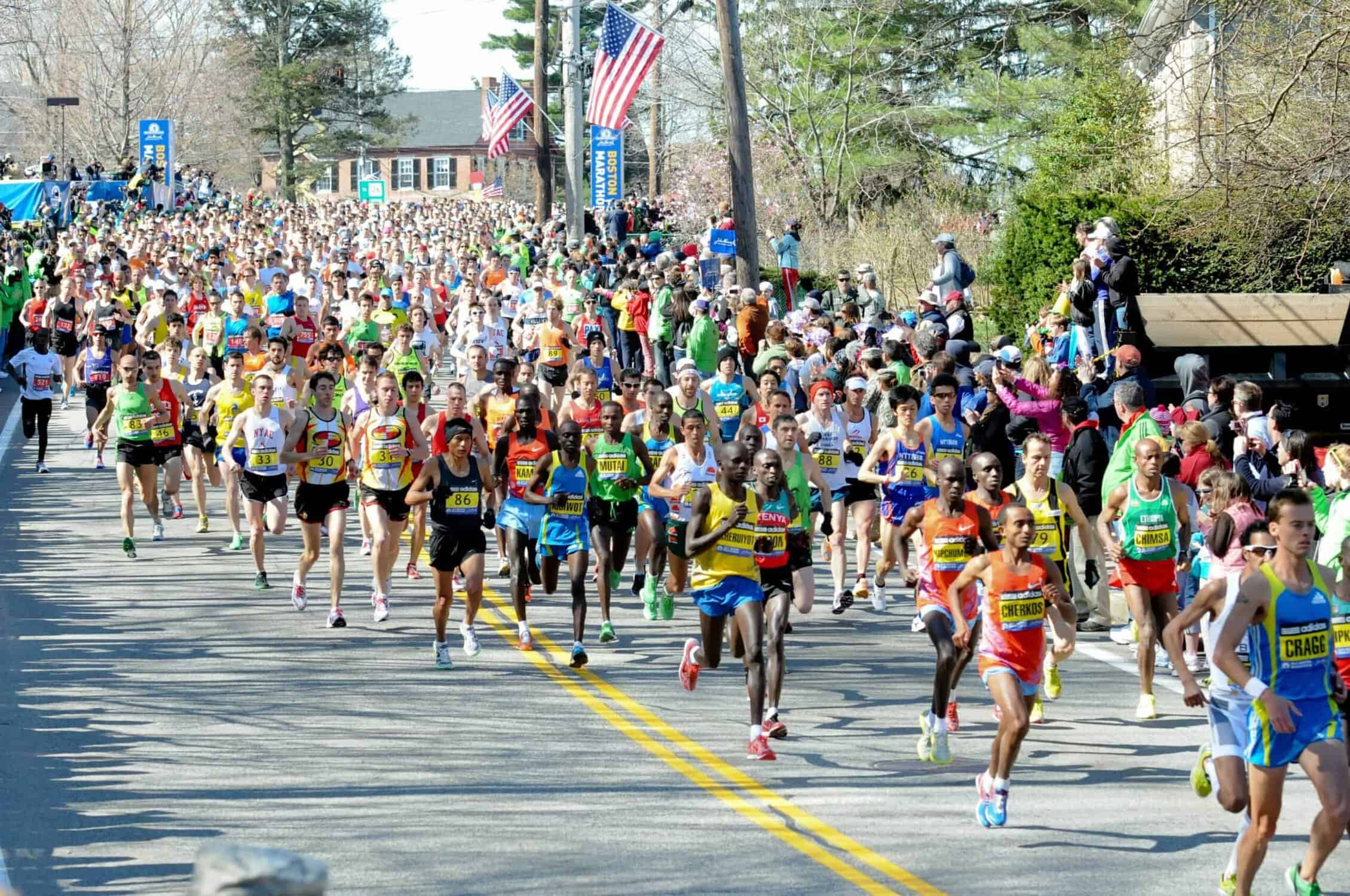
Some people run races just to cross the finish line, but many people want to challenge themselves and hit a good half marathon time. Whether it’s your first 13.1-mile race or your thirtieth, what is considered a “good” race time is totally individual to you. Your age, running experience, sex, and the race course itself will all influence what’s considered a challenging and do-able race pace and, therefore, finish time.
That being said, many runners want a goal to aim for. Here at Half Marathons Guide, we’ve studied a lot of 13.1 races and race times. A lot of beginner runners of every age is to run a half marathon in under two hours. That’s a running pace of 9 minutes and 9 seconds per mile.
Just running faster than your previous run and establishing a personal record may be the best goal for you.
Here’s what the running community considers a good half marathon time based on age and sex, along with tips on how you can shave minutes off your time and run faster.
What Is a Good Half Marathon Time?

“Advanced half marathon times” interpreted from Running Level
A good half marathon time depends on your gender, age, and fitness level:
- For males between 20 and 60 years old, a good half marathon time is between 01:30 and 01:51
- For females ages 20 to 60, a good time is 01:46 to 02:16
Specifically, a good half marathon time for males may look like:
- 1:30 at 20 years old
- 1:33 at 40 years old
- 1:51 at 60 years old
A good half marathon time for females may look like::
- 1:46 at 20 years old
- 1:49 at 40 years old
- 2:16 at 60 years old
These race times are most often the window for intermediate runners and advanced runners.
Elite and experienced runners will usually have a finishing time around the 1-hour race time.
The above data was taken from Running Level. We interpreted the “advanced” times to mean “good” finishing times. They are entirely possible for most runners, but definitely require a solid training plan, good mental strategy, and experience running.
What Is the Average Half Marathon Finish Time?

“Novice half marathon times” interpreted from Running Level to “average half marathon times.”
Beginner runners at any age group who have 16 to 20 weeks of training should expect to run a slower race than experienced runners. Therefore, the average between slower runners and faster runners may look like:
- 2:01 to 2:28 for males ages 20 to 60
- 2:19 to 2:59 for females age 20 to 60
Specifically, the average half marathon time for male runners may look like:
- 2:01 at 20 years old
- 2:04 at 40 years old
- 2:28 at 60 years old
An average half marathon time for female runners may look like::
- 2:19 at 20 years old
- 2:23 at 40 years old
- 2:59 at 60 years old
For the above chart, we’ve taken the “novice” half marathon times from Running Level and correlated them to equal the average. We’ve skipped the beginner times as we will assume most people have some training behind them and will be running most of the event.
What Factors Affect Your Half Marathon Time?

Not all half marathons are the same. Not are half marathon runners the same, either!
Your running performance and, in turn, your finishing time will be affected by:
- Your age
- Your fitness level
- Your training
- Your sex
- The race course’s elevation (is the course uphill, downhill, or flat?)
- The race course’s weather (too hot or too cold events will affect your finishing time)
What Are the Current Half Marathon World Records?
While you might not be gunning for a half marathon world record, knowing the best overall times can be motivating.
The current half marathon world records are held by:
- Jacob Kiplimo has the fastest half marathon time for men, a staggering 57:31 at the Lisboa, Portugal half marathon. The record was set in 2021, averaging a 4:23 per mile pace.
- Letesenbet Gidey holds the fastest half marathon time for women, clocking in at 1:02:52. The record was also set in 2021, this time at the Valencia half marathon with an average pace of 4:48 per mile.
How to Improve Your Half Marathon Time

If you want to improve your half marathon time, running more will only do so much. Yes, logging more miles will improve your aerobic capacity and overall efficiency, but there’s more to it. Here’s how to do it.
1. Add Variety to Your Training
Any good half marathon training plan will have one long run during the week. But the rest of your week should be a mix of different types of runs. These include:
- Tempo runs
- Easy runs
- Speed work & interval training
Tempo Runs
The tempo runs should be a staple session for all runners, whether you’re training for a half marathon, full-length distance marathon, or shorter events such as the 5k or 10k.
- Running at tempo is the maximum speed you can run while successfully clearing lactate — that’s the burning sensation you get during a hard effort. This is often called a lactate threshold.
- Adding tempo sessions allows your body to become more efficient at clearing that lactate. That means you can hold a faster pace for longer.
- These sessions also enforce proper running form — it’s a lot more difficult to run with poor form when running quickly. And while it’s still possible, these quicker efforts, paired with basic running form drills, will make you a more efficient runner.
So how do you do it?
A good tempo session for beginners is as follows:
- 10-minute warm-up jog
- 20 minutes @ tempo pace
- 10-minute cool-down jog
Once you’ve got a few basic tempo runs under your belt, you can increase the time up to 45 minutes.
Your tempo pace is approximately 25-30 seconds slower than your 5k best. It’s also known as “comfortably hard.” And if you’re training by running heart rate zones, aim for 80-85% of max HR.
For a running watch for better insight into your tempo runs and pacing, we’ve created a guide for that.
Easy Runs
All training plans — half marathon or not — include a handful of easy runs. It’s likely the type of running you’ll do most often.
Easy runs are when you recover from harder tempo, interval, and strength efforts. They also allow you to further develop your aerobic and cardiovascular endurance.
Run these at zone 2 or slower. They should feel “easy,” and you should be able to hold a conversation.
Zone 2 is low intensity; it’s a conversational pace. It’s approximately 60-70% of your max HR.
A good way to see if you’re running too fast is to run with a friend. If you struggle to hold a conversation, you’re running too quickly.
Easy runs are a great option if you’d still like to run on what you’d otherwise consider a rest day.
Speed Work & Interval Training
Speed work and interval training should be a staple of all half marathon training plans.
You need efforts above your half marathon pace (long runs) and efforts at, or faster than you’ll be running in the event (tempo and interval runs).
Interval training sessions may include:
- 12x400m repeats at 5k pace w/ jog recoveries for 1 lap
- 6x800m repeats at faster than your time goal half marathon pace w/ jog recoveries for 1 lap
- 1 mile repeats at time goal half marathon pace w/1-mile recoveries
2. Strength Train Every Week
We could almost hear the sigh you just let out right now. But here us out…
Adding 1-2 strength training sessions as a runner every week will help improve your running form and reduce your risk of injury. We especially love kettlebell workouts for runners for their versatility.
Strength training and any other type of cross training should not be done on the same days of running. Running the half marathon distance requires without strength or cross-training increases your risk of injury and muscle imbalances.
2. Set a goal pace
A common blunder many runners make is going out too quickly once the gun sounds. It’s essential to pace yourself when running a half marathon and it’s also smart to pace your training runs.
A pacing strategy ensures that:
- You make it to the finish line
- You don’t suffer too much in the final few miles
- Your body learns to run more efficiently
A good half marathon pacing strategy considers not only your target finish time but also variations in your race course (e.g., change of speed on a hilly course).
3. Warm up before running
The thought of running a half marathon can be daunting for some, never mind the notion of adding a couple of extra miles before the race.
But a short warm-up jog of 10-15 minutes will increase your heart rate, blood flow to the muscles, and will limber up your joints.
Warming up before your half marathon will improve your performance.
If you have the time (and space), perform a short 10-15 minute conversational jog followed by dynamic stretches and strides. This will also reduce your risk of injury.
Just make sure not to push it too hard so you don’t have a negative effect on your performance!
4. Pick a good half marathon training plan
If you want to run a decent half marathon, we recommend following a structured training plan.
We have a bunch of plans you can choose from, starting with as little as 8 weeks of training up to 20 weeks of training.
Following a plan takes the guesswork out of your training and ensures you’ll toe the line as prepared as possible.
Find a training plan that suits you.
Using a half marathon training plan that incorporates daily distance as well as pacing guidance is the best way to guarantee your performance and race results will be as close your goals as possible.
For many, a half marathon training plan will do the trick on helping you achieve your half marathon time goals. For others, you may need the personal accountability of a running coach.
FAQs
It depends on a man’s age, but for men at 20 years old, the average half marathon time is 2 hours and 1 minute. For men at 40, it’s 2 hours and 4 minutes while for men at 60 years old, the average half marathon time is 2 hours and 28 minutes.
A beginner should run a half marathon at whatever pace feels comfortable to them. A realistic time to aim for is between two to three hours.
A good half marathon time for women depends on age and fitness level, but generally around 1 hour and 46 minutes to 2 hours and 20 minutes.
You can improve your half marathon time by incorporating more speed work into your training, sticking to a faster race pace, and following a training plan that has time goals.
The fastest half marathon record is held by Jacob Kiplimo who ran 13.1 miles in 57 minutes and 31 seconds.
To run a half marathon in under 2 hours, you’ll need to run a pace of 9 minutes and 10 seconds or faster.





